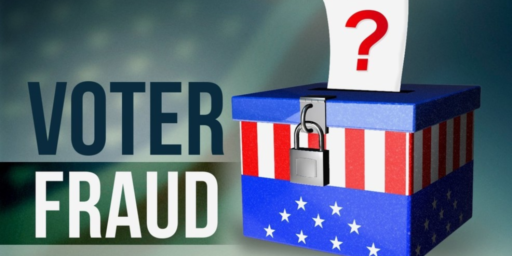Obama Fake Contributions and Wire Fraud
Megan McArdle and Mark Kleiman go round and round on recent National Journal and NYT reports that the Obama campaign was routinely accepting credit card donations from fake donors while the McCain campaign was rejecting them automatically using simple software applications. Kleiman points out that the reporters in question were technically committing wire fraud, Megan’s appalled at the suggestion of prosecuting reporters for getting at the truth, Kleiman was outraged at the suggestion that he was suggesting actual prosecution when he was merely suggesting that the reporters not report the story since they were technically violating the law with their investigative methods, which Megan doesn’t think much better.
When your candidate is caught violating basic financial prosecuting standards, standards which should, if anything, be stricter for politicians, the correct response is not to point out that uncovering this problem involved technically committed a crime. The correct response is “This is terrible. What is the campaign going to do to fix this?”
[…]
If it is possible to commit fraud on Obama’s website, then a citizen who uncovers this should be applauded, not least by the Obama campaign, which at least putatively does not want to violate campaign finance standards, nor make it easy for criminals to misuse someone’s credit card.
As this story from the National Journal makes clear, the candidate that Professor Kleiman and I both support seems to have systematically weaker protections against fraud than McCain. That is worrying. In the end, I don’t think it has made much difference; Obama isn’t winning because of his massive pocketbook, but because the Republicans got caught in bed with a naked financial crisis. But the principle is rather important.
Indeed. As Megan points out, there’s no direct evidence here as to why the Obama campaign was so lax. If it was intentional, it could have been maliciously made at a high level or made out of laziness at a low level; if unintentional, it could have happened in a variety of complicated ways. But noting the issue is worthwhile.
Of course, this once again serves to demonstrate the futility of the campaign finance regulation system. Any measures put in place will create loopholes and the remedy is always post-hoc.





Of course the transactions were turned down by McCain. Don’t these reporters know that McCain is not suppose to accept public donations since the convention since he accepted $84 million in public funds-sometimes reporters with political agendas don’t think
So what Kliman is saying is it’s OK as long as nobody gets caught? I can’t help but think he’d not be so generous if McCain’s people had been involved, instead.
Kliman seems in the tank for Obama and trying to dance around the obvious on illegal activity so as to not have to invoke the obviously logical conclusions involved.
He apparently sees very well indeed what happens to those who dare to tell the truth of the matter.
Obama and his campaign have said that running the campaign is executive preparation to be President. In fact, it is the only executive experience they will discuss.
Now we learn that the campaign willfully or negligently has a lack of management controls on donation collection. Nice executive experience you’ve got there. Most telling is that upon public discovery of this problem, the lack of controls has not been corrected.
And don’t tell me that someone else made the decisions. Obama is either in charge of his campaign or he isn’t.
James – do you have any statistics on the anonymous donations (both numbers and aggregate dollar amounts) compared to totals?
I think those might put this tempest in its proverbial teapot.
or more likely, will expose where all that money has actually been coming from. Given the lack of info on such matters… a lack of… shall we say… openness? … it seems most likely that’s info someone would rather we didn’t have until well after 11/4
I’ll take the pepsi challenge on that one Bit. I’m also certain that the information is currently publicly available, and I’d look it up myself if I weren’t gainfully employed.
Let’s make it interesting – if I’m right, you quit posting for a year (and vice versa, of course).
Or perhaps the futility of spending much time reading flame wars between Megan McArdle and Mark Kleiman.
I think the reason it was turned off is the obvious one-it made it easier to collect donations without having to vet the donator and it also opens the door for some donators to give more than the limit. I think this is pretty clear, since the software’s default setting is for the security.
I do think in the end that what all this proves is that the campaign finance system and the rules for it are broken-or at the very least fail to account for what current technology allows.
My feeling on the issue has long been that people or companies should be able to donate however much they want to a campaign without any limits, but that all donations should be fully disclosed and public and that the records should be available within a certain number of days of the donation-even if the donation is just $25.
As a rule I never attribute to malice what is easily explained by stupidity (or laziness). The Obama campaign was sloppy, not malicious.
As I understand it, this was a sin of commission (they turned the check off) rather than a sin of ommission (they forgot to turn it on).
It is amusing though how one candidate seems to get the benefit of the doubt whenever any potential questions are raised.
No, I assume that everybody’s stupid and/or lazy.
Dave what other reason would they turn off the software’s security settings?
That is why I am not so sure this was a case of stupidity. I think they realized turning off the security measures would allow them to get more donations that would be impossible to verify, which would in turn result in more money in the coffers.
And I’m not?
Comon, Billy. Call me when you get past your Sophmore year.
I am loosing track of the EVILS OF OBAMA.
Lets see, he is a socialist/marxist/terrorist/sex ed fiend/redistributorist/contribution cheater/lover of violent criminals/baby hater/family hater/hater hater/Iran embracer/celebrity.
He thinks Castro’s beard is cool.
Oh, and an anti-plumberite.
Call me when you can spell “come.”
From what I have read, the program involved come with the rejection software switched on. You have to switch the software off.
Eventually, if an Obama Justice Department, and a Democratic Congress, allow an investigation, we could be talking about hundreds of millions of dollars incorectly accepted.
Eventually, if an Obama Justice Department, and a Democratic Congress, allow an investigation, we could be talking about hundreds of millions of dollars incorectly accepted.
Which is the fly in the ointment. Anyone think for one second an Obama justice department or even the FEC would take action on this?
I don’t believe it, and I am not sure investigations are necessary, but I hope congress has taken note and seeks to fix the problems with our financing system-I think it is about time public financing be put out to pasture, and a requirement that all donations be made public record-even the small ones.
I sort of think this is a case of the law not keeping up with the technology, and I am certain Obama’s campaign saw the loophole and went for it. It is slimey IMO, but when it lets you run 10 or more ads to your opponents one ad, there isn’t any real pain. In the end the worst thing he looks at is a fine and/or a requirement to refund some of the dollars.
“Which is the fly in the ointment. Anyone think for one second an Obama justice department or even the FEC would take action on this?”
The FEC is hamstrung because it des not have a quorum and, for months, the Dems have refused to approve new members.
Malicious? No, I’m sure they aporached the entire question with the best of intent… after all their power is more important than some old election law…